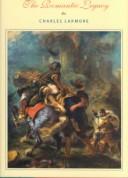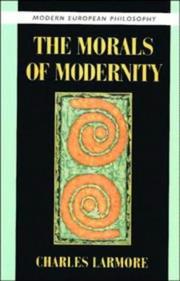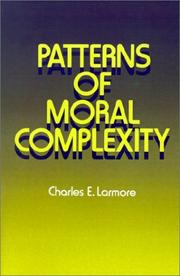| Listing 1 - 10 of 19 | << page >> |
Sort by
|
Book
ISBN: 2130516432 9782130516439 Year: 2004 Volume: *2 Publisher: Paris : PUF - Presses Universitaires de France,
Abstract | Keywords | Export | Availability | Bookmark
 Loading...
Loading...Choose an application
- Reference Manager
- EndNote
- RefWorks (Direct export to RefWorks)
Cogito --- Ethics --- Ethiek --- Ethique --- Ik (Filosofie) --- Moi (Philosophie) --- Self (Philosophy) --- Morale --- Ethics and moral

ISBN: 0231101341 Year: 1996 Publisher: New York (N.Y.): Columbia university press
Abstract | Keywords | Export | Availability | Bookmark
 Loading...
Loading...Choose an application
- Reference Manager
- EndNote
- RefWorks (Direct export to RefWorks)
Romanticism --- Pseudo-romanticism --- Romanticism in literature --- Aesthetics --- Fiction --- Literary movements --- Romanticism.

ISBN: 0521497728 0521497175 051162509X Year: 1996 Publisher: Cambridge : Cambridge University Press,
Abstract | Keywords | Export | Availability | Bookmark
 Loading...
Loading...Choose an application
- Reference Manager
- EndNote
- RefWorks (Direct export to RefWorks)
The essays collected in this volume all explore the problem of the relation between moral philosophy and modernity. Charles Larmore addresses this problem by attempting to define the way distinctive forms of modern experience should orientate our moral thinking. Charles Larmore wonders whether the dominant forms of modern philosophy have not become blind to important dimensions of the moral life. The book argues against recent attempts to return to the virtue-centered perspective of ancient Greek ethics. As well as exploring the differences between ancient and modern ethics, the author examines such topics as the roles of reason and history in our moral understanding, the inadequacy of philsophical naturalism, and the foundations of modern liberalism. There are also extended discussions of a number of leading contemporary philosophers: Rawls, Habermas, Williams and Rorty.
Ethics --- Ethics, Modern --- Deontology --- Ethics, Primitive --- Ethology --- Moral philosophy --- Morality --- Morals --- Philosophy, Moral --- Science, Moral --- Philosophy --- Values --- Liberalism --- Modernism (Christian theology) --- Political ethics --- Morale --- Libéralisme --- Modernisme --- Morale politique --- Arts and Humanities --- Ethics. --- Liberalism. --- Political ethics.

ISBN: 0521338913 0521330343 0511625103 9780521338912 9780511625107 9780521330343 Year: 1987 Publisher: Cambridge Cambridge University Press
Abstract | Keywords | Export | Availability | Bookmark
 Loading...
Loading...Choose an application
- Reference Manager
- EndNote
- RefWorks (Direct export to RefWorks)
Larmore aims to recover three forms of moral complexity that have often been neglected by moral and political philosophers. First, he argues that virtue is not simply the conscientious adherence to principle. Rather, the exercise of virtue apply. He argues - and this is the second pattern of complexity - that recognizing the value of constitutive ties with shared forms of life does not undermine the liberal ideal of political neutrality toward differing ideals of the good life. Finally Larmore agrues for what he calls the heterogeneity of morality. Moral thinking need not be exclusively deontological or consequentialist, and we should recognize that the ultimate sources of moral value are diverse. The arguments presented here do not attack the possibility of moral theory. But in addressing some of the central issues of moral and political thinking today thay attempt to restore to that thinking greater flexibility and a necessary sensitivity to our common experience.
Ethics. --- --Philosophie morale --- --Philosophie politique --- Ethics --- Deontology --- Ethics, Primitive --- Ethology --- Moral philosophy --- Morality --- Morals --- Philosophy, Moral --- Science, Moral --- Philosophy --- Values --- General ethics --- Éthique --- --Ethics --- Arts and Humanities --- Philosophie morale --- Philosophie politique
Book
ISBN: 9780521889131 0521889138 9780521717823 0521717825 9780511816611 0511429363 9780511429361 9780511429743 0511429746 0511816618 1107201179 1281903345 9786611903343 0511428170 0511427565 051142888X Year: 2008 Publisher: Cambridge, UK Cambridge University Press
Abstract | Keywords | Export | Availability | Bookmark
 Loading...
Loading...Choose an application
- Reference Manager
- EndNote
- RefWorks (Direct export to RefWorks)
In The Autonomy of Morality Charles Larmore challenges two ideas that have shaped the modern mind. The world, he argues, is not a realm of value-neutral fact, nor does human freedom consist in imposing principles of our own devising on an alien reality. Rather, reason consists in being responsive to reasons for thought and action that arise from the world itself. Larmore shows that the moral good has an authority that speaks for itself. Only in this light does the true basis of a liberal political order come into view, as well as the role of unexpected goods in the makeup of a life lived well.
Ethics. --- Reasoning. --- Argumentation --- Ratiocination --- Reason --- Thought and thinking --- Judgment (Logic) --- Logic --- Deontology --- Ethics, Primitive --- Ethology --- Moral philosophy --- Morality --- Morals --- Philosophy, Moral --- Science, Moral --- Philosophy --- Values --- Arts and Humanities
Book
ISBN: 1108691323 1108629601 1108472346 1108699960 Year: 2021 Publisher: Cambridge, United Kingdom ; New York, NY, USA : Cambridge University Press,
Abstract | Keywords | Export | Availability | Bookmark
 Loading...
Loading...Choose an application
- Reference Manager
- EndNote
- RefWorks (Direct export to RefWorks)
In this book, Charles Larmore develops an account of morality, freedom, and reason that rejects the naturalistic metaphysics shaping much of modern thought. Reason, Larmore argues, is responsiveness to reasons, and reasons themselves are essentially normative in character, consisting in the way that physical and psychological facts - facts about the world of nature - count in favor of possibilities of thought and action that we can take up. Moral judgments are true or false in virtue of the moral reasons there are. We need therefore a more comprehensive metaphysics that recognizes a normative dimension to reality as well. Though taking its point of departure in the analysis of moral judgment, this book branches widely into related topics such as freedom and the causal order of the world, textual interpretation, the nature of the self, self-knowledge, and the concept of duties to ourselves.
Ethics. --- Metaphysics. --- Philosophy --- God --- Ontology --- Philosophy of mind --- Deontology --- Ethics, Primitive --- Ethology --- Moral philosophy --- Morality --- Morals --- Philosophy, Moral --- Science, Moral --- Values
Book
ISBN: 2130638805 Year: 2004 Publisher: Paris (6, avenue Reille 75685) : P.U.F.,
Abstract | Keywords | Export | Availability | Bookmark
 Loading...
Loading...Choose an application
- Reference Manager
- EndNote
- RefWorks (Direct export to RefWorks)
Charles Larmore s'interroge sur la nature du rapport à soi fondamental qui fait de chacun un moi, à partir d'auteurs comme Montaigne, Stendhal, Proust, Sartre, Girard et Ricoeur. Il s'attache à discuter l'idéal de l'authenticité, afin d'en saisir le noyau irréductible, moment dans lequel on est « soi-même ». A partir de là, Larmore tente d'élucider le caractère du rapport à soi essentiel au moi, en le définissant comme un rapport d'engagement, dans des croyances, des désirs ou des actes. Ce rapport à soi, par lequel le moi se définit, n'est pas un rapport de connaissance immédiate : le moi se rapporte à lui-même de façon pratique et normative. Croire ou désirer quelque chose consiste ainsi à s'engager à suivre ce qu'on a des raisons de penser ou de faire. L'auteur s'attache à développer les conséquences éthiques de cette conception, afin d'être plus à même de comprendre ce que c'est qu'« être soi-même », de voir comment la connaissance de soi devient souvent un acte d'autocréation et d'apprécier à quel point notre bien est le fruit de l'imprévu. Ce livre a reçu le Grand Prix de l'Académie française en 2004.
Article
Abstract | Keywords | Export | Availability | Bookmark
 Loading...
Loading...Choose an application
- Reference Manager
- EndNote
- RefWorks (Direct export to RefWorks)
Article
Abstract | Keywords | Export | Availability | Bookmark
 Loading...
Loading...Choose an application
- Reference Manager
- EndNote
- RefWorks (Direct export to RefWorks)
Book
ISBN: 9780511625091 9780521497176 9780521497725 Year: 1996 Publisher: Cambridge Cambridge University Press
Abstract | Keywords | Export | Availability | Bookmark
 Loading...
Loading...Choose an application
- Reference Manager
- EndNote
- RefWorks (Direct export to RefWorks)
| Listing 1 - 10 of 19 | << page >> |
Sort by
|

 Search
Search Feedback
Feedback About UniCat
About UniCat  Help
Help News
News